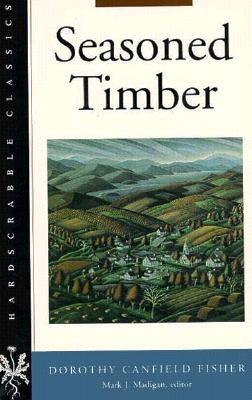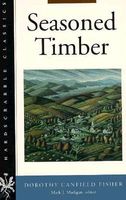- Welcome to FictionDB, Guest
- | My Account
- | Help

Seasoned Timber — Dorothy Canfield Fisher
"Nobody values anything for its endurance nowadays," T. C. Hulme, headmaster of the Clifford, Vermont Academy muses. Long devoted to the school and to his eccentric aunt, T. C. is increasingly aware that life is passing him by. His hopes are renewed when he falls in love with a new teacher 20 years his junior. But as Dorothy Canfield Fisher shows, neither love nor Academy life runs smooth.
A younger suitor steps in, and a rich, out-of-state trustee dies and leaves the Academy a million-dollar "gift" in his will. The codicils are troubling, however: Jews must be excluded, girls ousted, and local students squeezed out by a tuition hike. The affront to a Yankee sense of fair play is clear, but the school desperately needs funds. Thus T. C. and the town confront a struggle between the "old" virtues of tolerance, integrity, and civic responsibility and "modern" attitudes of expediency, exclusionism, and outside control.
Originally published in 1939, Fisher's last novel is remarkably prescient in its defense of human rights and the ramifications of their denial.
A younger suitor steps in, and a rich, out-of-state trustee dies and leaves the Academy a million-dollar "gift" in his will. The codicils are troubling, however: Jews must be excluded, girls ousted, and local students squeezed out by a tuition hike. The affront to a Yankee sense of fair play is clear, but the school desperately needs funds. Thus T. C. and the town confront a struggle between the "old" virtues of tolerance, integrity, and civic responsibility and "modern" attitudes of expediency, exclusionism, and outside control.
Originally published in 1939, Fisher's last novel is remarkably prescient in its defense of human rights and the ramifications of their denial.
Genres
Click on any of the links above to see more books like this one.

